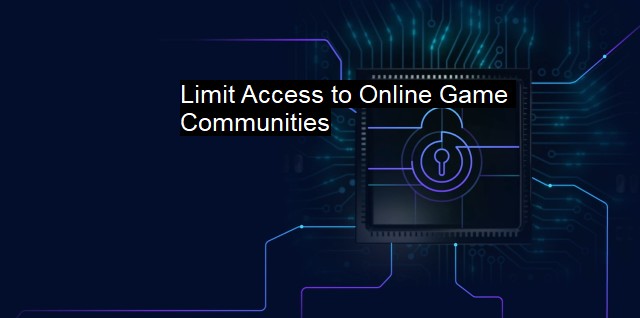What are Limit Access to Online Game Communities?
The Importance of Limited Access to Online Game Communities in Cybersecurity: Explained with Antivirus Software Protection
"Limit Access to Online Game Communities" refers to restricting the entrance or use of certain features of digital gaming platforms where people gather to interact, compete, collaborate, and enjoy video games online. This restriction or limitation ideally centres on parameters like time, age, or specific functionalities within the community to ensure that the users' gaming experience is safe, secure, and appropriate for their age or skill level.The existence of the internet has facilitated the rise of these online platforms, exacerbating the integration of game communities into the mainstream of modern recreation. Pyramiding on that, the astronomically increasing favour for these online communities over the last decade projected the online gaming industry into the mainstream limelight as they’ve become mainstream social interaction platforms and not simply a privacy-bound source of entertainment for the players. this increasing popularity and accessibility has also created a variety of cybersecurity challenges and threats.
Many online game communities are housed on big servers, boasting vast amounts of sensitive user data that if misappropriated, can result in severe breaches of privacy and potential cybersecurity threats. User data may range from the simple (usernames and email addresses), to the potentially life-altering (credit card information and home addresses), creating a hotbed for cybercriminals to operate. Cybersecurity threats in online game communities can take shape in various forms, such as identity theft, credit card fraud, spread of malware, Phishing, Bullying or other forms of digital abuse.
It is where limiting access to these online game communities plays a pivotal role, not just inhibiting the access of potential abusers and hackers but safeguarding the interests, privacy, and cybersecurity of the community members as well. One way this boundary is created is through age restriction and parental controls, inhibiting access to children who may be vulnerable to explicit content or cyber threats. Another tactic to limit access is multi-factor authentication procedures to verify the identity of the users and keep rogue elements at bay.
Sometimes, limiting access also means restricting the sorts of actions that users can take within the platform itself. some online game communities restrict monetary transactions within games, thereby limiting the opportunity for credit card theft or hacking. Some introduce restrictions on messaging between players to help curb cyberbullying or harassment. Others may implement advanced antivirus systems and encryption algorithms to ensure safe data handling practices and thereby protect the users' information.
Online game communities can also limit access to unauthorized users or unrecognized devices, also known as access control, an integral part of identity and access management (IAM). Primarily, this ensures that the user logging in is who they claim to be, greatly reducing the risk of identity theft or hacking. This practice becomes increasingly important in today's world where cyberattacks are on the rise.
These practices of limiting access in online game communities sharply attest to the notion of cybersecurity and antivirus practices. As the online world evolves, so do the underlying cyber threats jeopardizing these fields. Therefore, it is crucial to manifest vigilance in maintaining a secure and safe online gaming environment. Just as every coin has two sides, the recreational online gaming community also harbors the potential of bearing the dark underbelly of cyber threats. Thus, being privy to the possibility of these threats and putting into action the necessary preventive steps like 'Limiting Access to Online Game Communities' charts the preventive accords against possible security lapses and breaches in the fields of cybersecurity and antivirus.

Limit Access to Online Game Communities FAQs
What are the risks of not limiting access to online game communities?
The risks of not limiting access to online game communities include cyberbullying, exposure to inappropriate content, and the potential for hackers to gain access to personal information.How can limiting access to online game communities improve cybersecurity?
Limiting access to online game communities can improve cybersecurity by reducing the number of entry points for potential hackers and creating a more secure environment for users. It also allows for better monitoring and moderation of user activity.What are some methods for limiting access to online game communities?
Some methods for limiting access to online game communities include requiring users to create strong passwords, implementing two-factor authentication, limiting access to only verified accounts, and using content filtering to block inappropriate content.Why is it important to use antivirus software when accessing online game communities?
It's important to use antivirus software when accessing online game communities because it can help protect against malware and viruses that can be spread through links or downloads within the game. This type of software can also provide real-time protection against cyber threats and help detect and remove potentially harmful files.| | A | | | B | | | C | | | D | | | E | | | F | | | G | | | H | | | I | | | J | | | K | | | L | | | M | |
| | N | | | O | | | P | | | Q | | | R | | | S | | | T | | | U | | | V | | | W | | | X | | | Y | | | Z | |
| | 1 | | | 2 | | | 3 | | | 4 | | | 7 | | | 8 | | |||||||